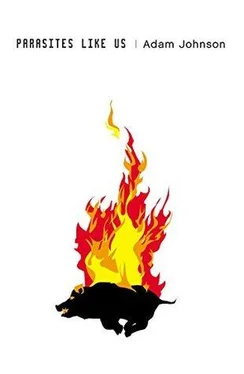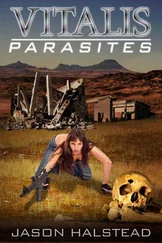I woke before dawn feeling unaccountably alone. The last of the moon was ghosting through the windows, and as my eyes came into focus, I expected to find myself in a distant and unknown place. Then I recognized the duck pattern of my sheets, realized I knew which dark doorway beyond my bed led to the closet and which to the bathroom. Houseplants materialized around me.
My hand was sore, the one I’d gripped the spear with, and I flexed it open and shut before pre-empting the alarm clock, which was set to go off any minute now. I was due to meet Farley, my old friend and lawyer, at the lake for the opening of the Glacier Days Ice Fishing Derby. The only reason, it occurred to me, to head out to a giant floating ice sheet, slip a silver hook into a cricket’s chest, and then lower him into a trillion gallons of freezing water was to remind yourself of the true rarity of warmth in this world. With a thumb, I pressed my palm, and the bones in my hand felt vulnerable and nervy, the way your teeth do after a trip to the dentist.
I washed my face with warm water, rubbing my eyes, holding my breath to avoid the smell of pig on my fingers. I pulled some cold long johns from the dryer and, ducking under some hanging houseplants, ate a bowl of cereal under the kitchen light, my blizzard overalls hanging open to the waist. This is what thirty-nine-year-old professors did in the morning when their careers had basically tanked. I rinsed the sink when I was done, flossed one more time, and into a five-gallon fishing bucket tossed a few tilt-up rods, a handful of split-shot sinkers, and a thermos.
Outside, as I clomped down the stoop of University Village, the USSD faculty housing, I saw that I was mistaken — the faint light was not the last of the moon but a first glimpse of sun. Or maybe the two had traded places. All the other professors and lecturers were asleep as I crossed the courtyard, cutting through campus toward the lake. The new snow moaned under my boots, and I cut a sad figure in the cold — there were no other footprints in the powder, and the purple frost of my breath simply vanished into the brittle stars above.
I had a bucket in one hand, a sandwich in each pocket, and, crossing campus, the air sharp in my nose, I felt outfitted for a lifetime alone. Farley kept setting me up with local women from town — a string of evenings with single mothers that never got past pink wine, balsamic vinaigrette, and, from the other side of the couch, invitations to grab some thigh. Farley meant well, but I couldn’t explain to him that if you’re feeling lonely and misunderstood it’s best to avoid other lonely people who misunderstand you.
Downhill was Eggers’ camp, and though I couldn’t make out the dark fur of his lodge, I could see a lazy strand of white smoke rising from it, which helped me locate Janis in the dark. Passing through some bare, knuckly tree trunks, I witnessed the quarry-black of my stepmother’s granite memorial slowly separate itself from the early black of morning. I came round to face her. A web of ice had formed across the bronze, and with my forearm, I wiped until I could make out her puffy cheeks and the line of her cat glasses.
I don’t know why I came out here and stood some mornings. I’ve seen other people speak to tombstones and urns and whatnot, and though the tears on their faces seemed genuine, it always left me feeling empty. But what else was there to do? What were my options?
“Hey,” I said to Janis’ plaque. Sometimes I told her how people were getting along now that she was gone, which more and more was “fine.” Today, I asked her, “What did you think of my lunch with Dad?”
It was cold out, quiet. To keep the blood flowing, I marched in place, the snow creaking under my feet. I looked around to see if anyone might be watching. How stupid I must look from a distance, a lone figure hunched and shifting, taking counsel with himself.
“He doesn’t seem to be making much progress,” I said. “If I have to, I’ll make like Aeneas, who slung his old man over his back and carried him out of the flames of Troy. Did I ever tell you that story?”
When most people spoke with the departed, they probably stuck to rhetorical questions, but I was trained to interrogate the dead, and it was hard for me to escape that, even if everything I asked was ridiculously stupid. But why ask questions that matter— Where are you? Can you hear me? Are you alone? — when the dead won’t even offer a fishing forecast.

I looked into the chilled bronze, trying to find some evidence of Janis, but those metallic eyes were fixed on the nowhere behind me. Where was the woman who made sure my father brought me souvenirs from wherever he traveled, the woman who helped me learn Latin, who fought my father over sending me to boarding school, who would never let him say a bad thing about my mother in front of me? Where was the woman who wouldn’t stop apologizing, there at the end, for leaving me?
I grabbed my bucket. “Your plants are looking pretty good,” was all I could manage without sounding too hollow to myself. “I’m going fishing with Farley, so I’ll ask how things are down at the courthouse.”
I turned into the snow, crossing the quad in just enough light to make out the edges of buildings. I passed the Liberal Arts Center, whose marble steps were worn by countless students, students whose hands had greased the rail a shiny black. I took no heart in the fact that they had all graduated and found their way in life. Rounding what was once the history building, I encountered a marble arch whose inscription from Santayana I’d read a thousand times: “Those Who Cannot Remember the Past Are Condemned to Repeat It.” The school once offered a graduate degree in history, but this was now the agri-business building. After World War II, people simply lost their thirst for the past. There was a day, though, when students roamed this campus with books underarm like Cradle of the Euphrates, The Last Days of Pompeii , and Knuutsen’s five-volume Maya.
Who today has read The Chief Regrets of Wali al-Qu’atar ?
Herodotus, Aurelius — forgotten.
As I passed the empty hall, that Santayana quote began to make me angry. His words had once been my motto, but today they seemed a lie. I thought, Point to the book that will guide the way. Show me the story. Didn’t life’s real lessons come firsthand, and only once, so that, if you ever gained some wisdom, you’d never get another chance to use it? What man goes to war twice? Who has two mothers, dressed in blue, disappear into the snow, and who then loses two stepmothers? Can any person spend two lifetimes alone?
I turned the corner onto Central Green — there, beyond the final slope of campus, was the Missouri. Normally, white sheets extended far from the banks, so that it looked as if the snowy fields ran right out into the middle of the river, leaving only the creek of the central channel. But all the ice last night had indeed broken free, and this great bicep of water in the breaking light was sparkly black, as if the river cut through banks of pumice. The surface was flashing, roiled with eddies, enough that a stranger wouldn’t know which direction it flowed. And there was an odd tincture to the water, unusual for winter, somehow purplish and ruddy. The color had the oily maroon of the tallow smoke that bellowed from the stacks above Hormel’s rendering floors. The sight reminded me of a comet’s coma, of its sooty, smoking ice, and in the distance, standing before this meteor tail of a river, I made out a lone nude figure.
Читать дальше













